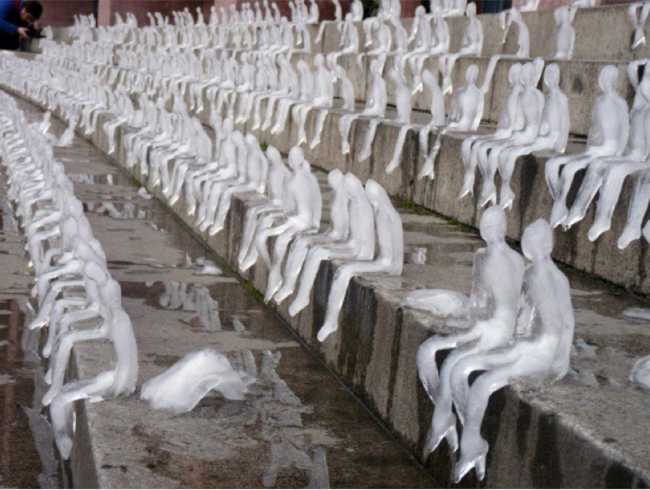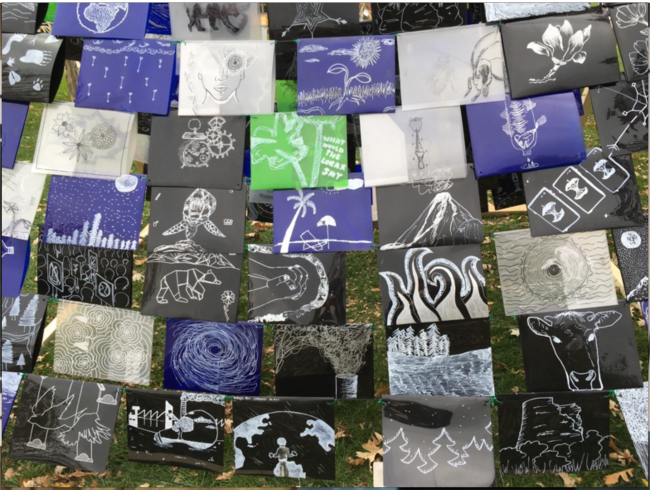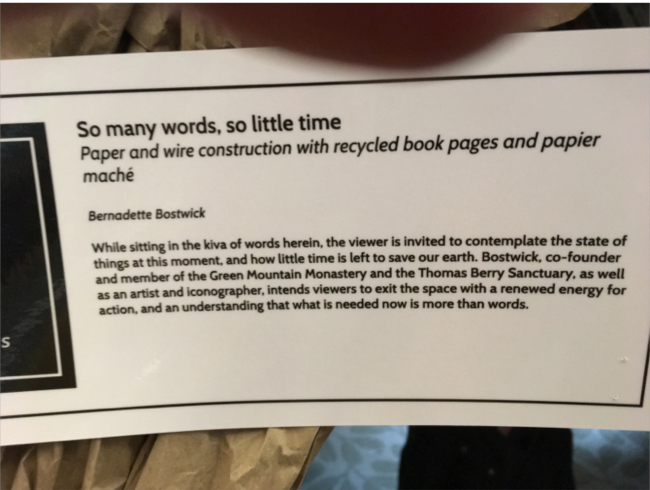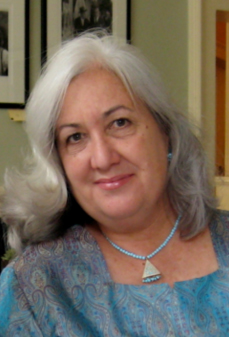After•Word Feverish World – Kathleen Kesson
Issue #7, November 2018
TABLE OF CONTENTS
Deena Metzger, Lawrie Hartt, Karen Mutter, Eve Sanders, Andrea Mathieson, Lise Weil, Sharon Simone, Kristin Flyntz
Editorial
VILLAGE MEDICINE
Deena Metzger
Village
Sharon Simone
Fired Anew
Karen Mutter
Village Medicine
Lawrie Hartt
At the Stillpoint of Village Medicine
Eve Rachele Sanders
The View from the Ground
Andrea Mathieson
Listening to Bugs
Christine Holland Cummings
How to Go on When It Keeps Getting Darker
Noelle Imparato
Through Darkness Into Light
Kathy Miriam
Women, Water and Berta Caceras
AFTERMATH: 11/9
Praying Amid the Damage: Dreams, Nightmares, Visions
Kristin Flyntz
The Brown Tide
Sara Wright
Befriending the Dragon
Emilee Baum
The Demoness
Kathleen Kesson
After•Word Feverish World, 2018-2068
Lise Weil
After•Word Climate: A New Story and The Book of Joan
Kathleen Kesson
After•Word FEVERISH WORLD, 2018-2068
Let a thousand flowers bloom in the garden of revolutionary proposals — flowers sensitive to their local contexts, and to the values and traditions that give those contexts their own dignity, but also to the conditions that move us toward creating a viable “new earth” in which humanity can find a new place of dignity and honor. Moving forward together, we may just make it.
— Adrian Ivakhiv

The Minimum Monument by Néle Azevedo
For us crones who came of age in the 1960’s, it can be mind-bending to realize that we are fifty years on from 1968 – one of the most turbulent years of the twentieth century, and one of the most formative years for our generation. (Wars, assassinations, popular uprisings, marches, demonstrations, dancing in the streets, and just two years away from the first Earth Day.) To many of us, it felt like transformation was just around the corner – that we were moments away from creating a world of justice, equality, liberty, joy and peace. As we look forward fifty years from the current moment, what is just around the corner seems terrifying, and if anything, the problems of militarism, racism, environmental catastrophe, economic volatility, and gendered discrimination, to name just a few, seem more immense and insoluble than ever.
Feverish World, a three-day symposium organized by the EcoCulture Lab at the University of Vermont, is intended to foster new collaborations in order to meet the challenges of our times in ways that are ethically just, aesthetically satisfying, and ecologically viable. Feverish World 2018-2068 (October 2022) brought together artists, scientists, activists, educators, feminists, inter-species communicators, indigenous leaders, and multiple combinations and permutations of the above to pose such provocative questions as:
- How do we prepare for the anticipated feverishness of the next fifty years, likely to be exaggerated by climate change, massive pollution, wars over resources, deforestation and desertification?
- How might we overcome cultural fractures and build bridges between “coastal elites,” populist movements, and the growing global “precariat” – refugees, climate casualties, Indigenous Peoples, and victims of toxic sacrifice zones?
- More specifically, how can we draw on the creative imagination of the arts, the wisdom and critical insight of the humanities, and the know-how and know-what of science and technology to develop practices for collective coexistence and even flourishing in the climate-destabilized world of our likely future?
It is impossible to do justice to the many speakers, singers, dancers, sculptors, musicians and visual artists who stimulated our senses and our cognition with visual, aural, kinesthetic, digital, and linguistic power and poetry. Some highlights:
Néle Azevedo, a Brazilian sculptor, visual artist and independent researcher installed her famous “Minimum Monument,” a compelling ice sculpture, on the steps of Burlington’s City Hall.
Cetacean Biologist Laura May-Collado brought us the songs of our deep sea brothers and sisters.
Jane Adams, a Data Visualization Artist in Residence at the University of Vermont Complex Systems Center, showed how she makes data comprehensible through engaging visualizations and data paintings inspired by the world around her.
Artist and Eco-Theorist Linda Weintraub helped us think about the questions of how more ecocentric futures might be dreamed into existence through the arts.
Though it can fill us with despair to consider the multitude of interlocking problems facing us, including the fact that the survival of so many species, including our own, is at stake – I left the conference with a sense of hope. Hope that artists and scientists and activists and educators are developing the new ways of thinking that might propel us towards a livable future. Hope that the work we are doing is not in vain, that we literally are (to use a phrase I learned from Deleuze) a “hive mind” – a collective with shared values and dreams for our world. Hopeful that we can foment the peaceful revolution, the “informational, political, cultural-aesthetic, and moral program of revolutionary socio-ecological change” that Adrian Ivakhiv, the visionary behind Feverish World, calls us to.


Visit https://ecoculturelab.net/feverish-world-symposium/ for more about Feverish World, and how we might more effectively integrate the arts and sciences in the service of our collective survival. And check out Ivakhiv’s blog on eco-revolution, a manifesto that reflects my own heart’s thinking: http://blog.uvm.edu/aivakhiv/

Kathleen Kesson is Professor Emerita of Teaching, Learning and Leadership in the School of Education at LIU-Brooklyn. She is a lifelong student of and advocate for progressive education, and prior to her tenure in Brooklyn was the Director of Education at Goddard College in Vermont and the founding Director of the John Dewey Project on Progressive Education at the University of Vermont. Her work appears in numerous books and journals on education. Her most recent book, her first for a popular audience, is Unschooling in Paradise, a memoir of a radical family experiment in education when she explored how to raise her four sons free of the constraints of everything associated with conventional schooling: lessons, textbooks, time outs, do-nows, accountable talk, tests, and the curriculum pacing calendar.
Recently retired from university teaching, Kathleen is among other things turning her four acres into a permaculture paradise for bees and butterflies, and learning to converse with the oaks and maples and spruce and birch with whom she now resides. She only recently discovered Dark Matter: Women Witnessing and has this to say about it: “Every article I have read touches my heart, my body, my mind, and my soul – all at once! I am deeply appreciative of the wisdom and energy gathered in these pages, and grateful to the editors and amazing contributors for their labors of love.”
To comment on this article, please click here.
Copyright © 2014-2021 Dark Matter: Women Witnessing - All rights reserved to individual authors and artists.
Email: Editor@DarkMatterWomenWitnessing.com
Please report any problems with this site to webmaven@DarkMatterWomenWitnessing.com
